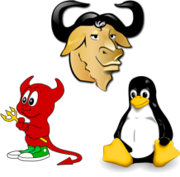What is Open Source?


It’s all that, but it’s much more.
Open source would not exist without the Internet. It requires the frictionless marketing and distribution the Internet provides, as well as its low-cost collaboration and shared storage.
These are more than features. They are also values, shared beliefs like transparency, connectivity, and openness. Companies which seem to violate these values are hammered by open source advocates. Those which embrace these values tend to succeed.
The values of the Internet, and of open source, are based on shared myths, stories of their development which may or may not be completely true. Many of these myths have names.
The egalitarianism of Richard Stallman, the practicality of Eric Raymond, the engineering values of Linus Torvalds. So, too, the stories of Vint Cerf, of Tim Berners-Lee, and of early peering arrangements, in which moving money became secondary to moving bits.
Many people have trouble getting their arms around this because these are political values. Issues like net neutrality and open spectrum are extensions of these Internet values, and thus open source values, into the regulatory sphere.
But it’s when these values are applied to the act of running a business, or any large organization, that they become truly revolutionary.
Consider Google and Microsoft, as I did earlier this week. Now consider that these same differences and risks exist in every other industry, across the board. It is the biggest change in business methods since the rise of manufacturing and mass market advertising a century ago, and we still don’t know how far that change will extend.
While it may be comfortable to think of open source merely in terms of software, that just won’t cut it. Open source is the term we apply to the impact of the Internet on the software business, but its lessons are valid across all industries, in both business and politics, and frankly, you ain’t seen nothing yet.